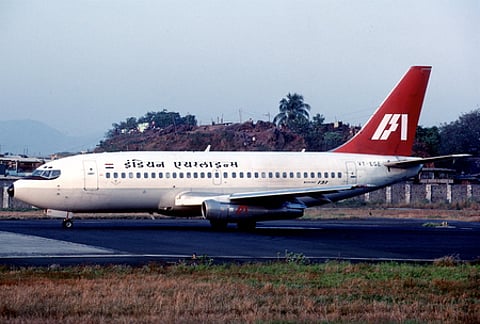

The hijack of the Indian Airlines flight 814 commonly known as 'IC 814,' is in the news more than two decades later, following the release of a Netflix series based on the incident.
The Anubhav Sinha directed series titled IC 814 - The Kandahar Hijack starring Vijay Varma, Naseeruddin Shah, Pankaj Kapur, Aravind Swamy and Dia Mirza in key roles has sparked a controversy over the depiction of the hijackers involved in the longest ever hijack in India's history.
The IC 814 en route to New Delhi from Kathmandu was hijacked as soon as it entered Indian airspace and flown to different locations including Amritsar, Lahore and Dubai before finally landing in the then Taliban ruled Kandahar in Afghanistan after eight long days.
The controversy surrounding the series erupted from right wing social media handles over the 'Hindu' code names used in the series to identify the hijackers. However government data substantiates that these code names were originally used by the hijackers during the incident and the series has just incorporated it.
Whatsoever, like the recent trend goes, the content head of Netflix India Monika Shergill was summoned by the Union information and broadcasting ministry and demanded an explanation regarding the 'problematic' depiction of the hijackers in the series. Besides the incorporation of 'Hindu' code names, the government was also reportedly disturbed by the portrayal of the negotiation procedures headed by the current National security advisor Ajit Doval and the alleged omission of the role played by Pakistani intelligence agencies in the hijack.
However the obvious reason for this rage as pointed out by many is that the BJP led government, which constantly boasts of its advancements and priorities in ensuring national security has its head heated up on the digging up of one of the grave intelligence and strategic failures that happened during the reign of its tall leaders.
Several blatant lapses were flagged with regard to the government's handling of the crisis situation. This included the Prime Minister of the BJP led coalition regime, Atal Bihari Vajpayee not being informed of the hijack for about one hour. This traced to lapses from the part of the Joint Intelligence Committee (JIC) and the RAW. Another dangerous strategic failure was allowing the plane to take off from a military airport in Amritsar.
However, after eight long days, India gave into the demands of hijackers to release three militants- Ahmed Omar Saeed Sheikh, Masood Azhar and Mushtaq Ahmed Zargar- in return for the hostages. One of the released militants, Masood Azhar, later went on to form Jaish-e-Mohammed, a terror outfit accused of orchestrating several attacks on India including the 2019 Pulwama attack.
High-profile passenger
Several reasons for this embarrassing compromise have been discussed and debated. One of the possible reasons less highlighted by the media and underplayed by the recently released series is the presence of a high profile passenger among the 176 passengers held hostage by the hijackers. The VIP passenger who is believed to have played a huge role in mounting international pressure on India during the negotiations is a Swiss-Italian businessman named Roberto Giori.
Roberto Giori was the then owner of De La Rue, a UK-based company that controlled 90% of the world’s currency-printing business. According to a report by the TIME in 2000, Giori was returning from a holiday in Kathmandu with his companion Cristina Calabresi.
The TIME report stated that he was one of the richest man in Switzerland at the time.
"At one point during the eight-day hijacking of Indian Airlines Flight 814, the abductors demanded $200 million from the Indian government. Little did they know that one of the hostages sitting in economy class could have effortlessly written them a check for that amount," the report said.
Giori's presence in the flight was an addition to the pressure on Indian government as the Switzerland secretly dispatched a special convoy to Kandahar to demand the facilitation of his immediate release. However, what makes this diplomatic intervention and the possibly consequential stand taken by the Indian government further intriguing is the reportedly shady business engagements of De La Rue in India.
De La Rue and Panama Papers
De La Rue is a global player that dominates the business of currency note printing and production of features like security thread and security holograms used in banknotes for supplying to central banks across the world.
The firm was a major supplier of these materials to India until 2016. In 2016, the firm was named in the Panama Papers with evidence that it had authorised a payment of a 15% commission via its subsidiary company, Portals, to its Indian agent for securing banknote contracts, reported Indian Express.
During the preceding years, its business in India was marred with controversies. According to a report by Indian Express, the firm was first caught in controversy in the year 2010 after its internal inquiry found that some of the watermarked currency paper it had supplied to India had failed quality parameters.
"The company also admitted that some of its employees had “falsified” test certificates submitted to the Reserve Bank of India, and that British enforcement agencies had been informed of the incident," the Indian Express reported.
Subsequently an inquiry was ordered and the firm was blacklisted and denied security clearance by the Home Ministry for currency paper contracts in 2011.
But in 2012, the then finance secretary Arvind Mayaram extended De La Rue's expired contract for the supply of colour shift (security) thread without tenders. In 2017, CBI initiated an enquiry into the matter. The CBI, in its FIR, has alleged that the extension given to De La Rue was an “illegal” act, and that the company did not possess the exclusive India patent that they were meant to work with.